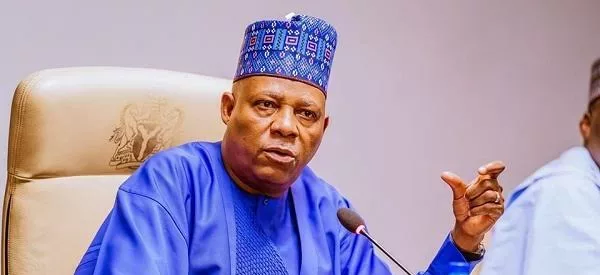Nigeria’s Vice President, Senator Kashim Shettima, has said the nation is currently witnessing a silent but resolute transformation under the administration of President Bola Tinubu.
This is coming just as Nigeria and the Federative Republic of Brazil have tweaked their strategic alliance to advance economic development in key sectors, including agriculture, food security infrastructure, clean energy, trade and industry, among others.
Senator Shettima who spoke on Wednesday during the Nigeria–Brazil Business Forum tagged, “Roots to Revenue: The Nigeria–Brazil Corridor”, on day three of the Nigeria–Brazil Strategic Dialogue Mechanism (SDM), in Abuja, said the renewed strategic alliance with Brazil is grounded in intent, and rich in the potential for mutual growth.
According to him, Brazil’s journey, especially the strides in agriculture, energy, infrastructure and industrial development, speaks to ongoing transformation in Nigeria, and reflects “what is possible when technical capacity is matched with national determination.
“These are the same areas where Nigeria is making bold moves. Under the leadership of His Excellency, President Bola Ahmed Tinubu, Nigeria is undergoing a quiet but resolute transformation. Markets are being opened. Institutions are being rebuilt. Policies are being refocused.
“And what drives these changes is a seriousness of purpose that goes beyond reform for reform’s sake. What we seek are partners who see our direction, who respect our ambition, and who are prepared to walk the path with us,” he stated.
Underscoring the need for the strategic alliance with Brazil, VP Shettima noted, according to a statement by his spokesman, Stanley Nkwocha, that Nigeria is embarking on a journey similar to that of the South American country, particularly in agriculture, as well as the transformation through sustained investment in research, modernisation and support for farmers.
“Our Special Agro-Industrial Processing Zones are taking form. Our farmers are ready to operate at scale. But we know the difference between going alone and going far. Brazil can stand with us in this effort, not as a donor, but as a partner in innovation, in training and in investment.
“We are equally attentive to your leadership in clean energy. Nigeria’s energy transition is rooted in what we can control. We are harnessing our gas reserves to power our industries and transportation, while also advancing our renewable energy ambitions. Brazil’s example provides guidance that is real and tested.
“We are eager to learn from your experience in building an energy economy that creates jobs, supports industries and expands access to rural communities. Our teams are ready to engage on how to move from policy to practice, from ideas to infrastructure,” the VP said.
He further disclosed that Nigeria is encouraged by Brazil’s interest in skills development and human capital, saying it aligns perfectly with one of the most pressing national goals, which is to ensure that the youthful country is prepared for future demands.
“We welcome the opportunity for institutional partnerships that promote training, research and the exchange of knowledge in sectors where Brazil has built strength, and in areas where Nigeria is gaining ground,” he added.
Earlier, the Vice President of Brazil, H.E. Geraldo Alckmin, reaffirmed Brazil’s commitment to strengthening bilateral relations with Nigeria through long-term cooperation, shared innovation, and mutual economic growth.
Alckmin described the moment as “one of the most promising” in the history of Nigeria-Brazil diplomatic and commercial relations.
“This is a necessary complement to deepen our relationship. We want this moment to correspond to the production of sustainable partnerships for our people,” he declared.
Highlighting the potential in key sectors such as agriculture, defence, innovation, and energy, Alckmin acknowledged that despite the strong historic and cultural ties, trade volumes between both countries are still much lower than the potential.
“Our trade is growing, but it can increase tremendously. Brazil is ready to work with Nigeria to build a commercially successful South-South corridor,” he stated.
He also spoke on the Green Imperative Initiative (GPI), a $1.1 billion programme to transfer Brazilian agricultural technology to Nigeria, as a model of transformative South-South cooperation.
“Brazil does not just export products, but solutions and ideas,” Alckmin said, adding that under President Lula’s administration, Brazil has simplified its tax regime and is exploring a direct flight route to Nigeria to ease business travel and trade.
On Nigeria’s side, the Minister of Industry, Trade and Investment, Dr Jumoke Oduwole, called for a reset in the bilateral trade dynamic, lamenting the current $2 billion trade volume, down from $9 billion a decade ago.
Dr Oduwole outlined Nigeria’s priority sectors for investment, including agro-industrial value chains, digital trade, the creative economy, and pharmaceuticals.
She also revealed efforts by the Nigerian government to streamline investor engagement through a digital portal tracking live project pipelines.
“We are serious about institutional delivery. Our agencies—NEPC, NIPC, PEBEC, NASENI—are working as one team,” she noted.
Also speaking, Director General of the Presidential Enabling Business Environment Council (PEBEC), Princess Zarah Mustapha, emphasised state-level reforms as critical to unlocking sub-national investments.
Also, NIPC’s representative, Mrs Victoria Aigbedion, reiterated Nigeria’s commitment to creating a regulatory climate attractive to investors, especially in mining, infrastructure, creative industries, and logistics.











